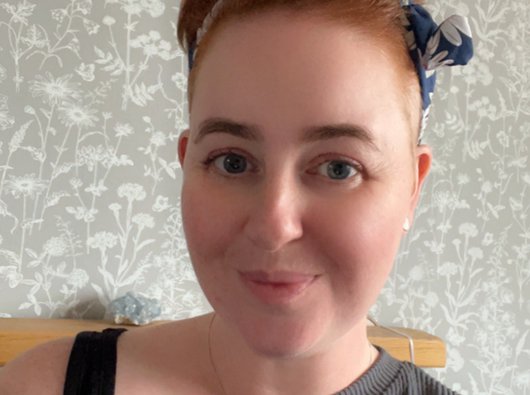Side effects of myelofibrosis treatment
Treatment for myelofibrosis (MF) can cause unwanted side effects. Tell your hospital team if you notice any changes in how you feel, so that they can help you.
Everyone is different
Some side effects are more common than others. But it’s important to understand that no two people react to treatment in the same way. So even people with the same condition on the same treatment for myelofibrosis (MF) will have different side effects.
You may not have any side effects. But if you do notice a change, tell your hospital team. They can prescribe medicine to help with side effects and suggest self-help tips to ease the symptoms of MF. Side effects can be mental as well as physical – this is particularly the case with interferon. So do report changes to your mood as well as physical symptoms.
We have information about common side effects of blood cancer treatment, including hair loss, fatigue (extreme tiredness) and problems with digestion.
If you want to find out more
Your hospital team will talk through common side effects of the medicines they prescribe and give you information on how to manage side effects. Your doctor or nurse will also answer any questions you have about side effects.
You should be given a patient leaflet with any drugs you have. This lists side effects according to how common they are. You can also find these leaflets online on the EMC (Electronic Medicines Compendium) website.
It can be alarming to read a long list of side effects. But drug manufacturers are obliged to include every side effect that’s been reported to them, and that’s why the list is so long.
Talk to your hospital team or our Support Service if you are worried about side effects.
Risk of other cancers
Some treatments may increase the chance of myelofibrosis developing into a different type of blood cancer. Your doctor will weigh up the benefits and risks and talk them through with you when you discuss treatment. They will also give you regular check-ups.
A few people who take ruxolitinib have developed skin cancer. It isn’t clear whether this is caused by the ruxolitinib or something else, but it’s best to be careful and follow standard sun safety advice. Tell your doctor if you notice any changes to your skin.
Hydroxycarbamide may very rarely increase the chance of developing acute myeloid leukaemia if it is taken for a long time, but the evidence for this is not clear.
People taking hydroxycarbamide may also have an increased risk of skin cancer, so it’s always important to follow standard sun safety advice.
Busulfan may increase the risk of developing acute myeloid leukaemia if used over a long period. For this reason, it isn’t often recommended for younger people.
Preserving your fertility
Some drugs used to treat myelofibrosis can affect your ability to have children, whether you are female or male. If you want to start a family or think you might in the future, talk to your hospital team before you start treatment. It may affect your treatment plan.
Interferon is less likely to affect your fertility and may be recommended if you are thinking about having a child. Or you may have the option of fertility treatment such as freezing your eggs or sperm before you start treatment.
See our page on protecting your fertility for more information.
"It didn’t even cross my mind at first that treatment could affect my fertility and I wouldn’t have thought to ask...Thinking about fertility is difficult when you’re contending with a diagnosis of blood cancer at the same time."
Kerry, living with blood cancer since 2021
Read Kerry's story about having fertility treatment.

Using contraception when you’re on drug treatment
It’s important to use a barrier method of contraception such as condoms while you or a sexual partner are having treatment with ruxolitinib, fedratinib, hydroxycarbamide or busulfan.
There are two important reasons for this:
- Drugs may be present in bodily fluids and passed on during sex, so you must use barrier contraception even if you cannot get pregnant.
- Drugs may cause damage to a growing baby, so it is essential to avoid getting pregnant. This is the case whichever partner is having chemotherapy, as it can affect sperm as well as eggs.
If you want to try for a baby now or in the future, talk to your hospital team. They may be able to change your treatment.
Using the contraceptive pill
There is some evidence that the combined contraceptive pill can increase your risk of blood clots. If you are at risk of blood clots because of myelofibrosis or another condition, ask your GP about a contraceptive pill that is safe for you, or other methods of contraception.
Treatment during pregnancy
It is possible to have treatment for myelofibrosis (MF) while you are pregnant. Aspirin is safe to take and may be recommended if you have low or intermediate-1 risk MF. If you have intermediate-2 or high risk MF, you may be advised to have treatment with interferon.
You shouldn’t take warfarin or other anticoagulant tablets during pregnancy. If you usually take these, you may be given an anticoagulant called heparin, which is given by injection. This is safe to use during pregnancy.
Both you and the baby will be closely monitored with extra scans to see how the baby is growing and check the blood vessels that carry blood to your womb. You may be looked after in a specialist centre during your pregnancy.
Managing the menopause
Many women take hormone replacement therapy (HRT) to help with symptoms of the menopause.
There is evidence that HRT tablets can increase your risk of blood clots, so if you have myelofibrosis and are taking HRT as a tablet, it’s important to discuss this with your hospital team or GP.
There’s no evidence that HRT patches or gels increase your risk of blood clots, so there are alternatives to HRT tablets that may be safer for you. Talk to your doctor and take their advice.
If you need an operation
If you need to have an operation for another health condition, then your surgical team needs to know that you have myelofibrosis and get advice from your specialist doctor (haematologist). You may need to stop taking certain drugs before the operation – your haematologist will advise how to do this.

Talk to other people affected by blood cancer
Hear from and connect with people who understand.
